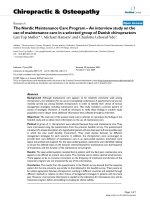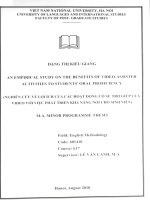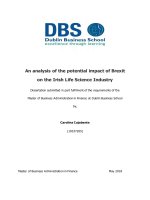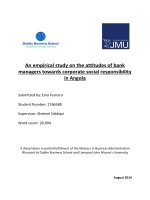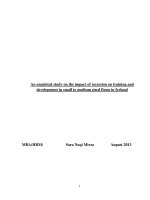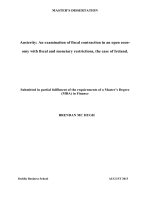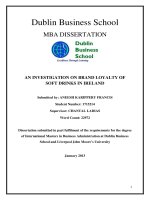Master Thesis in Economics: An empirical study on the attitudes of bank managers
Bạn đang xem bản rút gọn của tài liệu. Xem và tải ngay bản đầy đủ của tài liệu tại đây (1.96 MB, 135 trang )
An empirical study on the attitudes of bank
managers towards corporate social responsibility
in Angola
Submitted by: Enia Ferreira
Student Number: 1766588
Supervisor: Shakeel Siddiqui
Word count: 20,994
A dissertation in partial fulfillment of the Masters in Business Administration
(Finance) to Dublin Business School and Liverpool John Moore’s University
August 2014
Acknowledgments
First and foremost, I would like to thank Jehovah God for his love, strength and protection.
I would also like thank my supervisor Shakeel Siddiqui for his help and support throughout
the completion of this research project.
Finally, I would like to express my appreciation to all my family and friends for their
encouragement throughout the course of my studies. In particular I would thank my parents
Ana Tati and Paulo Ferreira for their love and support always.
1
Table of Contents
Acknowledgments................................................................................................................................... 1
Abstract ................................................................................................................................................... 6
Chapter 1: Introduction .......................................................................................................................... 7
1.1 Background of the problem........................................................................................................... 7
1.2 Research suitability ..................................................................................................................... 10
1.3 Recipients of the Research .......................................................................................................... 11
1.4 Scope of Research ....................................................................................................................... 11
1.5 Approach to the dissertation ....................................................................................................... 12
1.6 Organisation of the dissertation .................................................................................................. 13
1.7 The major contributions of the study .......................................................................................... 15
Chapter 2: Literature Review ................................................................................................................ 16
2.1 Introduction to literature review ................................................................................................. 16
2.2 Banking Industry in Angola ........................................................................................................ 16
2.3 Introduction to the concept ......................................................................................................... 20
2.3.1 Carroll’s four-part model of corporate social responsibility .................................................... 22
2.3.1.1 Economic Responsibilities ................................................................................................. 22
2.3.1.2 Legal responsibilities ......................................................................................................... 22
2.3.1.3Ethical Responsibilities....................................................................................................... 23
2.3.1.4 Philanthropic Responsibilities ........................................................................................... 23
2.3. 2 Contextual focus on corporate social responsibility ............................................................... 25
2.3.2.1 Economic Responsibilities ................................................................................................. 27
2.3.2.2 Philanthropic responsibilities ............................................................................................ 27
2.3.2.3 Legal Responsibilities ........................................................................................................ 28
2.3.2.4 Ethical Responsibilities ...................................................................................................... 28
2.4 Corporate social responsibility in banks ..................................................................................... 29
2.4.1 CSR in banks in the developing world..................................................................................... 33
2.4. 1.1 The Financial Crisis ........................................................................................................... 35
2.5 Emergence of CSR in Developing countries .............................................................................. 37
2.5.1 Motives for engaging in CSR ................................................................................................ 39
2.6 Conclusion chapter 2................................................................................................................... 45
Chapter 3: Research Methodology: ...................................................................................................... 47
3.1 Research Questions ..................................................................................................................... 48
3.2 Hypotheses Development ........................................................................................................... 49
3.3 Proposed Methodology ............................................................................................................... 50
2
3.4 Research Philosophy: Positivism ................................................................................................ 50
3.5 Ontology ..................................................................................................................................... 51
3.6 Research Approach: Deductive ................................................................................................... 51
3.7 Research Strategy........................................................................................................................ 53
(Burton, 2000, p.144). .................................................................................................................. 53
3.8 Research Choice.......................................................................................................................... 54
3.9 Time Horizons ............................................................................................................................ 55
3.10 Data collection Methods ........................................................................................................... 56
3.10.1 Questionnaires ................................................................................................................... 57
3.10.2 Semi- Structured Interviews .............................................................................................. 60
3.11 Sample....................................................................................................................................... 63
3.11.1 Sample size......................................................................................................................... 64
3.12 Research Ethics ......................................................................................................................... 65
3.13 Limitations of the research........................................................................................................ 66
Chapter 4: Data Findings and Analysis .................................................................................................. 68
4.1Questionnaire Analysis ................................................................................................................ 69
4.1.1 Demographic Characteristics ............................................................................................... 69
4.1.2 Ranking of CSR Dimensions by bank managers ................................................................... 74
4.1.2.1 Bank Mangers Attitudes on the CSR Conceptualisation ...................................................... 77
4.1.3 Hypothesis testing................................................................................................................ 79
4.2 Interview Data Analysis .............................................................................................................. 80
4.3 Culture......................................................................................................................................... 85
4.4 Data comparison: comparing data from the quantitative and qualitative data sources ............... 87
Chapter 5 Conclusions and Recommendations .................................................................................... 89
5.1 Angolan Bank Managers attitudes on the CSR Conceptualisation ............................................. 89
5.2The majors drivers for CSR in Angolan banks ............................................................................ 91
5.3 The CSR activities banks pursuing are pursing .......................................................................... 93
Chapter 6 Self -Reflection ..................................................................................................................... 95
6.1 Reflection on Process .................................................................................................................. 95
6.2 Reflection on sources .................................................................................................................. 97
6.3 Reflection on the formulation of dissertation process................................................................. 98
6.4 Reflection on own learning ......................................................................................................... 99
6.5 Skills Development ................................................................................................................... 101
6.5.1 Time management ............................................................................................................. 101
6.5.2 Decision Making ................................................................................................................. 101
3
6.5.3 Ability to challenge myself ................................................................................................. 102
6.6 Future applications of learning ................................................................................................. 103
Chapter 7: Bibliography ...................................................................................................................... 104
Chapter 8: Appendices ........................................................................................................................ 125
Appendix 1: The number of banks operating in Angola ................................................................. 125
Appendix 2: Scholars defining CSR (source: adapted from Russell (2010 p.44-47) ..................... 126
Appendix 3: Characteristics of CSR in developing countries ......................................................... 128
Appendix 4: Questionnaire ............................................................................................................. 129
Appendix5: Cover Letter ................................................................................................................ 130
Appendix 6: Interview Questions ................................................................................................... 131
Appendix 7: CSR Group Statistics ................................................................................................. 132
Appendix 8: Independent Samples Test......................................................................................... 133
List of Figures
Figure
Page
1
Angolan banking sectors positioning in the approach to CSR………………………………….……18
2
Carroll’s classic pyramid of CSR………………………………………………………………………...24
3
Visser’s CSR pyramid for developing countries………………………………………………………..26
4
Expenditure of banks……………………………………………………………………………………….29
5
The CSR concept in the banking industry……………………………………………………………….31
6
Driving forces for developing countries…………………………………………………………………45
7
The research onion…………………………………………………………………………………………47
8
Research choices ……………………………………………………………………………………….….55
9
Data collection methods……………………………………………………………………………..……56
10
The pyramid of CSR for this study…………………………………………………………………….…88
11
Kolb’s learning cycle……………………………………………………………………………………...99
4
List of Charts
Chart
Page
1
Gender of the respondents…………………………………………………………….69
2
Age group of the respondents………………………………………………………..70
3
Ownership of bank ……………………………………………………………………71
4
Years of service…………………………………………………………………………72
List of Tables
Table
1
Years of service………………………………………………………………………72
2
Major characteristics of the respondents………………………………..………73
3
Economic dimension statistics ……………………………………………………74
4
Legal dimension statistics …………………………………………………………74
5
Ethical dimension statistics ………………………………………………….…..75
6
Philanthropic dimension statistics ……………………………………..…….…75
7
Average mean score of the four dimensions………………………………….…76
5
Abstract
In recent years, the issue of Corporate Social Responsibility (CSR) has become an important
research topic, with studies appearing quite frequently. However, research has largely
focused on developed countries. This research seeks to explore attitudes towards CSR in
developing countries in the context of banks in Angola. The study is also concerned with
establishing the main forces driving CSR in Angolan banks and the type of CSR practices
banks are pursuing.
A structured questionnaire was completed by middle level bank manager’s to test their
attitudes towards the four dimensions of CSR proposed by Carroll (1979). The study found
that bank managers ranked the economic dimensions as the most important responsibility
followed by legal, philanthropic and ethical.
Furthermore, Interviews were held with two senior bank managers to investigate the reasons
why the order of priority differs from Carroll (1979) and Visser (2008) who adapted the
priority of dimensions in developing countries. The study found that the political action is not
only having an immense effect on the attitudes towards CSR but that it is also the main
reason banks are motivated to practice CSR. The study also revealed that banks were mostly
involved in philanthropic and charitable activities.
By the end of this study, it is intended to highlight the fact that banks and government have
different perceptions of CSR. As a result, it is recommended that banks align their CSR
values and behaviour with the expectations of the government.
6
Chapter 1: Introduction
1.1 Background of the problem
Corporate social responsibility (CSR) has become an important focus for corporations
worldwide. CSR refers to “the continuing commitment by businesses to behave ethically and
contribute to economic development while improving the quality of life of the workforce and
their families as well as of the local community and society at large” (The World Business
Council for Sustainable Development , 2000). While by definition the concept of CSR is
nothing new, today, more and more corporations are realising that in order to stay
‘competitive and relevant’, it is extremely important that they behave in a socially responsible
way (Calabrese et al., 2013). Moreover, according to Jayakumar, (2013, p.1) CSR “provides
legitimacy to corporate actions and activities” which makes the subject of immense interest to
government, business and society. As a result, corporate social responsibly has become an
important research topic with studies of CSR appearing quite frequently.
However, much of the research has focused largely on the developed world. Although this
focus, helped us to characterize the concept of corporate social responsibility, Blowfield and
Frynas (2005, p.499) call for as a “necessity” research focusing on the developing world.
According to recent research by Azmat and Ha, (2013) this call is still rendered necessary.
The rationale for focusing on CSR in developing countries is twofold. Firstly, developing
countries are where the social issues are most felt in the world (Visser, 2008). Secondly,
developing countries face distinctive challenges in this area as compared to those faced in the
developed world with regard to “low living standards, exploitation, poverty, unemployment
and how to promote human development in general” (Hopkins, 2007, p.7). As suggested by
Visser (2008) the changing context opens new avenues for research. Therefore, it is important
7
that research is carried out on CSR in the developing world. As such, this research explores
attitudes towards CSR within the context of a developing country, Angola specifically. In
recent years, studies on the attitude towards CSR have received a lot of attention in the
academic literature regarding CSR. According to Rosnal et al., (2013, p.1) there is “mounting
concern on how the future generations view the importance of embracing CSR in every
business decisions”.
This study explores attitudes of Angolan bank mangers towards CSR. Within current
literature, there is an emerging body of thought which suggests that since the recent economic
crisis, the concept of CSR has gained significant momentum in banks, especially in
developing countries (Yeung, 2011). This is because research has shown that CSR practices
by banks in developing countries “not only improve their own standards but also catalyse the
socially responsible behaviour of other businesses” (Ullah, 2012).This is supported by
Hopkins (2012, p.84) who affirms that “the promotion and adoption of CSR both in
industrialised and developing countries will eventually raise everyone’s standard of living
from which all will eventually benefit”. Thus, the importance of CSR in banking industries
cannot be overemphasised. A primary consideration in conducting this study in Angola was
that there has been a ‘serious’ push for CSR strategies and activities in the national banking
sector (Lusa, 2013). An additional reason for choosing the banking sector in Angola is that
the government is working to reduce the country’s reliance on oil by directing their attention
towards the financial sector that can “bolster the many sectors that can also offer the country
opportunities for expansion” (World Finance, 2014).
Furthermore, there is growing
acceptance of the view among regulators that in order to have the greatest chance of success,
banks have to act in a socially responsible manner. Regulators have the expectation that CSR
will inject new air into the banking sector and the positive development of the sector.
8
All these factors make the banking industry in Angola the ideal context in which to study
CSR. Even though some research has been conducted on the banking sector, a large amount
of CSR literature has concerned the oil industry (Wigg and Ramalho, 2005).
There is gap in the literature which does not address bank’s perspective of CSR. Therefore,
the aim of this study is to explore the attitudes of Angolan bank managers towards CSR,
using Carroll's CSR pyramid which views CSR as “the simultaneous fulfilment of the firm’s
economic, legal, ethical and philanthropic responsibilities” (Carroll, 1979). While many
studies have tested Carroll’s conceptualisation of CSR, this concept has not yet been tested in
Angola (Ibrahim and Angelidis, 1995; Pinkston and Carroll, 1996; Edmondson and Carroll,
1999; Smith et al., 2001; Ibrahim et al., 2003; Maignan and Ferrell, 2003; Marz et al., 2003;
Kusku and Frazer, 2004; Peterson, 2004; Smith et al., 2004; Angelidis and Ibrahim et al.,
2004; Ibrahim and Parsa, 2005). This study intends to fill this gap.
9
1.2 Research suitability
Saunders et al., (2007, p.22-23) advices that when choosing your research topic, if the
researcher wishes to “become an expert in a particular subject area or industry sector, it is
sensible to use the opportunity to develop this expertise”.
The researcher has a particular interest in the chosen topic because there is little or no
research on this field of study in Angola. With CSR gaining prominence in the finance
industry in Angola (as the economy evolves from being largely dependent on oil), it has
awoken the researcher’s interest to develop her knowledge in this line of research. The
researcher views this as good opportunity to hone skills acquired during the MBA and test
them in a country with a different financial environment. As a natural progression, the
researcher hopes to work in the financial sector in Angola and continue to contribute to this
line of research; this current research is very beneficial in achieving the aforementioned.
Having access to the research population coupled with knowledge and capabilities acquired
in the MBA program, the researcher is most capable of undertaking this research project.
10
1.3 Recipients of the Research
The dissertation titled ‘An empirical study on the attitudes of bank managers towards
corporate social responsibility in Angola’ is submitted in partial fulfilment of the requirement
for the MBA course in Dublin Business School, Ireland. Therefore, the primary recipients of
this research project will be Dublin Business School in conjunction with Liverpool John
Moore’s University along with the appointed supervisor Shakeel Siddiqui.
Due to the nature of research being carried out, samples of private and public banks in
Angola are likely to be interested in the outcomes of this research. There is a further
possibility that other developing countries who are currently working towards establishing
CSR initiatives may also find this piece of research beneficial.
1.4 Scope of Research
This study explores the attitudes of Angolan bank managers towards CSR, using Carroll's
CSR pyramid framework. The research will also identify the main drivers of CSR in banks
and the type of CSR initiatives they are pursuing.
11
1.5 Approach to the dissertation
In order to answer the research questions and test the hypotheses discussed in chapter 3.1 and
3.2 the research reanalysed secondary data that has been collected for some other purpose
(Saunders et al., 2009). An extensive literature review was carried out using academic
journals, books and government publications. Through the review of the literature the
researcher was able to develop key ideas and themes that relate to the research questions
(Saunders et al., 2009).The main advantage of using secondary data is that it can provide
quick data but because it only partially answered our research questions, primary data was
also utilised. Quantitative primary data was collected using questionnaires and semistructured interviews. The data obtained from the questionnaires was analysed statistically
using SPSS and thereafter interpreted.
Both primary and secondary data helped the researcher to draw appropriate conclusions that
speak directly to the research questions (Zikmund and Babin, 2013). In line with this
analysis, appropriate recommendations were given.
12
1.6 Organisation of the dissertation
In order to make it easier for the reader this research has been divided into 8 chapters. The
chapters are briefly described below:
Chapter 1: Introduction
This chapter provides the rationale for the study and background of the problem. The chapter
includes the researcher’s interest in the topic, approach to dissertations, limitations of the
research, research recipients, and major contributions of the study.
Chapter 2: Literature Review
Chapter two will examine literature in the field of CSR. As the subject matter is very
widespread a great focus was done to keep the subject representing the matter at hand. The
chapter is divided into four sections. It begins with giving an overview of the banking sector
in Angola. The following section defines the concept of CSR. The role of CSR in banks is
examined in the next section. Finally, the emergence of CSR in developing countries is
discussed.
Chapter 3: Research methodology
This chapter includes the description and rationale for the research methodology.
Chapter 4: Data Analysis and Findings:
This chapter consists of the findings of the research. The data collected are presented and
explained in line with the research questions.
13
Chapter: 5 Conclusions and Recommendations:
This chapter provides conclusions and recommendations based on findings.
Chapter 6: Self Reflection on Own Learning and Performance
This chapter will reflect on the learning process undertaken during the MBA course.
Chapter 7: Bibliography
This chapter provides a list of sources which were consulted during the research work.
Chapter 8: Appendices
This final chapter includes information that supports the research analysis.
14
1.7 The major contributions of the study
In this research, important contributions are made in different sections of the project. The
literature review gives some valuable insight into the characteristics of CSR in developing
countries. Therefore, this study bridges the gap between CSR and the developing world from
the view of Angolan bank managers. It enhances the African perspective of CSR, thereby
further increasing our understanding of how CSR is viewed in the developing world.
The results of this research will not only inform the readers about the main drivers of CSR in
Angolan banks and the type of CSR activities banks are pursuing, it further establishes
attitudes towards CSR. This will produce a much clearer picture of where the banks are going
on this subject. The researcher hopes that this result will benefit banks, regulators and other
public officials in Angola, through providing academic insight into manager’s inclination to
respond in a particular way to CSR (Zu, 2009).
In line with this, the findings and conclusions of the study will provide a reference point to
the area of CSR in Angolan banks.
15
Chapter 2: Literature Review
2.1 Introduction to literature review
The last chapter introduced the subject and outlined the main aims of the research. In this
section of the research, literature in the field of CSR will be examined. According to Miller
and Yang, (2008, p.62) literature reviews are important because they “give the reader, the
historical background on a given subject”. In the context of CSR, a review of literature will
provide clarity on the subject, making it easier for the reader to follow the logic behind the
research questions. The review of literature will also provide a strong base for answering the
research questions.
The first section of this chapter provides an overview of the banking
sector in Angola to allow the chapter to be interpreted in the context of the research.
2.2 Banking Industry in Angola
The Republic of Angola is the third-largest economy in Africa and has the third largest
financial market in Africa South of the Sahara (Deloitte, 2013). Since political stability arose
in 2002, Angola is becoming one of the fastest-growing places on earth (White, 2012). World
Bank data shows that 10 years ago, Angola’s GDP was just $10 billion but has since
increased to $121.7 billion to become one of the most prosperous economies in the SubSaharan region (World Finance, 2014). While this success has been mainly due to the oil
sector, the growth of the banking sector is increasingly supplementing the country’s
economic strength (The Africa Report, 2014). The Angolan banking sector is expected to
grow at a faster rate than any other country in sub-Saharan Africa (World Finance,
2012).According to research conducted by Kinsella Marketing and Promotions Group
(KMPG) on the economic growth in Angola “the evolution of the number of Banks operating
16
in Angola over the last few years is intrinsically tied to the positive economic evolution of the
Country”. This evolution fostered the creation of better conditions and opportunities in the
Banking Sector, leading to an increase in the number of Institutions operating” (KMPG,
2012, p.8). While in year 2005, there were only thirteen banks, today there are twenty three
(refer to appendix 1). According to recent estimates, they are projected to grow 15% per
annum by 2020 and in the next decade, become the most profitable on the continent as a
result of new Foreign Exchange Laws for the oil sector (Deloitte, 2013). Under the new rules
which came into effect In June 2013, oil companies pay salaries and suppliers through
accounts with local banks. According to the Economist Intelligence Unit (EIU) this will
“funnel $10 billion a year through Angola’s economy and further support the value of the
kwanza” (Angola currency) (McClelland, 2012). Analysts predict that this recent reform will
foster further transparency and competition in Angola’s financial system. (McClelland,
2012).
In recent years Angola’s financial system has undergone many reforms to liberalize and
privatize the previously heavily state‐controlled financial system. The government, World
Bank, IMF and most recent oil companies have played a major role in the number of changes
in the financial sector. These include “requirements for foreign reserves, bank regulations
concerning weekly foreign currency auctions, capital ratios, and amounts of dollar holdings”
(McClelland, 2012). One of the biggest changes to the banking sector includes the
introduction of CSR. In the last three to five years, the number of banks in Angola practicing
some form of CSR has increased dramatically. This is in accordance with Amaladoss and
Manohar’s (2011) observation that more and more domestic banks in developing countries
are realizing that they have social responsibilities to fulfil “as they emerge from the shadow
of traditional banking”.
17
According to a report made one of the largest banks in the country Angolan’s Bank of
Investments (BAI) the acceptance of social responsibility in the banking sector is deriving
naturally from the growth of the institutions and legislative reforms. (BAI, 2013). The report
concluded that rather than following in the footsteps of a country in change, the banking
sector is becoming a true agent of this change. This is echoed in recent research by the United
Nations Development Program (2013) in Angola which found that the banking sector is in
conservative positioning in terms of their maturity of CSR practices, (as illustrated in figure
1) they “have a considerable degree of maturity in the practices, they develop and define
areas of intervention that are aligned with stakeholders expectations and with material issues”
(United Nations Development Program, 2013, p.11).
Figure 1: Angolan banking sectors’ positioning in the approach to CSR
(Source: United Nations Development Program, 2013)
18
The largest study of CSR in the Angolan banking sector was carried out by the World Bank
Group in 2002. The report concluded that the implementation of CSR in Angola is a
challenge for the reasons set forth below:
Angola had just emerged from a devastating twenty-seven year civil war
Angola has been plagued by reports of corruption, opaque politics and a lack of fiscal
accountability.
An uneasy relationship exists between public and private sectors
Angola’s civil society is extremely weak and lacks the capacity to serve an advocacy
or implementation role for CSR.
Crippling poverty amongst the vast majority of the country’s population
Angola’s oil dominated economy has tended to crowd out resources and attention to
other sectors (World Bank Group, 2002).
More than 12 years has passed since the review of CSR in Angola by World Bank and there
is a current need for a new comprehensive review. From the discussion in the previous
paragraph, it is clear that gaps exist in relation to the perceptions of CSR; this research will
address this gap by determining the attitudes of bank managers on the CSR concept proposed
by Carroll (1979). It has become relevant to review this issue today ahead of a new, political,
economic and social reality. According to a recent article by Angola’s leading newspaper O
Pais, (2014) the “Angolan reality has evolved greatly in recent years” with the development
of new projects that not only support the community such as improvements in labour salaries
and conditions but also what they refer to as ‘hard actions’ directed towards educating
employees about the values of CSR. For example, in 2013, Angola had its first conference
on Corporate Social Responsibility, an initiative of Angola’s central bank (Banco Nacional
de Angola). Similarly, the study of CSR in Angola by the United Nations Development
19
Program ( 2013, p.5 ) revealed that “when compared with other countries of Sub-Saharan
Africa and other countries with low Human Development Index (HDI), Angola is showing a
progressive evolution”.
2.3 Introduction to the concept
As the notion of CSR becomes more widespread, it is important to first define what is meant
by CSR (Hsu 2012). Another reason for outlining what CSR means is to give the reader a
clear picture of the concept being discussed. This is important because findings from existing
studies reveal common misunderstandings about CSR in developing countries. For example
research by Gesellschaftura Technische Zusammeenarbeit (GTZ) (2009) in China found that
whilst most Chinese firms realised the importance of CSR, very few of them understood what
CSR means. As suggested by Matten and Moon (2008, p.405) defining CSR is not easy for
three reasons. Firstly, CSR is an “essentially contested concept”. Secondly, they argue that
CSR “covers, overlap, and exists simultaneously with other business-society relation
concepts”. Thirdly, because it’s meaning is “fluid and always evolving”. These issues are
further aggravated by the fact there is no globally accepted definition of CSR. In recent years,
different numbers of definitions of CSR have appeared. Some studies have found over 27
definitions of CSR (Carroll and Buchholtz, 2012). For selected academic definition of CSR
and criticisms associated with these definitions please refer to appendix 2
Appendix 2 underscores Campbell’s (2007, p.950) point that “socially responsible corporate
behaviour may mean different things in different places to different people and at different
times”. This argument has been supported in the work of Votaw (1972) who argued that
“CSR means something, but not always the same thing, to everybody” (Votaw, 1972, cited in
20
Dunne 2007). Whereas some organisations view CSR as a strategic activity, others view it as
a moral stand (Lantos, 2001). According to Fox, (2004) conflicting academic
conceptualisations of CSR such as these have led to a ‘withdrawal’ from the CSR agenda. It
also helps to explain why companies pursue different types of CSR activities, with some
oriented to the customers, whilst others oriented to environmental issues. However, many
writers see merit in there being no strong consensus on CSR. Daly (1992, cited in Dunne
(2007, p.373) argued that “the very lack of clarity regarding what CSR means has perhaps
become its single greatest strength: without any formal determination or widely accepted
definition, CSR has come to mean so very much”.
While there are many definitions of CSR, according to these definitions CSR refers to
“idealistic views on organisations performing activities that protect and improve society’s
wellbeing beyond the extent required serving the direct economic and technical interests of
these organisations, thus the society at large” (Russell, 2010, cited in Kraus and
Brititzelmaier, 2012, p. 3). The fundamental idea is that business corporations have an
obligation to work toward the betterment of society (Singh et al., 2013).This view has
become very popular and has led to the introduction of various models that seek to capture
the responsibilities businesses are expected to assume. For example, Lantos (2001) identified
3 different types of responsibilities; ethical, altruistic and strategic. Wood’s (1991) model
identified principles, processes and policies as three elements of CSR. Crane et al., (2008)
contemporary model groups CSR activities into four components: market place, workplace,
environment and community while Meehan et al., (2006) looks at CSR using three variables:
consistency, commitment and connections. This research however, will examine Carroll’s
four-part definition of CSR as it represents “a significant advance” in research (Mazutis,
2014).
21
2.3.1 Carroll’s four-part model of corporate social
responsibility
Carroll's (1979) one of the pioneers of CSR, defines it as:
“The total corporate social responsibility of business entails the simultaneous
fulfilment of the firm’s economic, legal, ethical and philanthropic responsibilities.
Stated in more pragmatic and managerial terms, the CSR firm should strive to make a
profit, obey the law, be ethical, and be a good corporate citizen “(Carroll, 1979, p.
43).
2.3.1.1 Economic Responsibilities- Carroll (1979) himself suggests that”the first
and foremost social responsibility of business is economic in nature”. He stresses that it is
important for the organisation to provide a return on shareholder’s investment,
maintain/improve competitive position, create new products and as a general rule, be as
profitable as possible (Zu, 2009). However, Carroll (1979) argued that the responsibilities of
business entailed the fulfilments of all responsibilities. (Figure 2 illustrates the pyramid of
CSR)
2.3.1.2 Legal responsibilities- The second component legal responsibility involves
businesses complying with the “societal legal system”. This includes compliance with legal
requirements including workers safety and tax laws. Much of the CSR literature on legal
responsibilities admits that it hard to know whether firms are “playing by the rules of the
game” (Ramasamy and Yeung, 2009). A critical viewpoint is raised by Solomon (1994 cited
in Jamali, 2007, p.4) who stated that “laws attempt to circumscribe the limits of tolerable
behaviour, but they neither define ethics nor do they legalise morality”. Accordingly,
Solomon (1994) further explains that ethical responsibilities are designed to overcome some
22
of the limitations of the law. Today a major source of disagreement in the literature is
whether CSR is a voluntary business action. According to Banerjee (2007) interpretations of
CSR differ vastly in this point. There is mixed support for both of these theoretical claims.
Many scholars argue that because CSR is often embedded in legal mechanisms it should not
be considered a voluntary responsibility (Lantos, 2001). However, authors such as Jamali
(2007) strongly argue that social responsibility that involve businesses complying with the
“societal legal system” ought to be considered CSR because it promotes ethical and
responsible business behaviour.
2.3.1.3Ethical Responsibilities- The third component ethical responsibilities
according to Carroll (1979) “encompasses activities that are not necessarily codified into
law, but are nevertheless expected of business by societal members such as respecting people,
avoiding social harm and preventing social injury” (Lantos, 2001, p.599). Much of the
criticisms of Carroll’s (1979) model surround the very notion of ethical responsibilities, as
many critics argue that ethical responsibilities are “ill-defined and open to debate”
(Vallabhaneni, 2009, Rungler, 2010).
2.3.1.4 Philanthropic Responsibilities- The final responsibility Carroll refers to
as ‘discretionary responsibilities’ because they are aimed at giving back to society. Examples
of these voluntary activities include supporting charities. According to Carroll (1979) these
are considered to be the “least important among the rest of social responsibilities”. While
they are considered the least important according to many authors they carry the greatest
implication. This is because the philanthropic type of corporate social responsibility “is not
incorporated directly into the organization's core business” (Fufukawa, 2010, p.48). It
therefore, comes in direct conflict with the economic and profit-making orientation of
business firms” (Jamali, 2007, p.4).
23
Figure 2: Carroll’s classic pyramid of CSR
(Source: Carroll, 1979)
24

